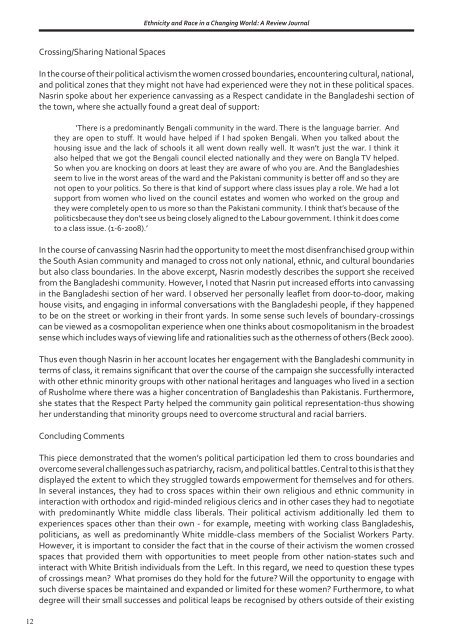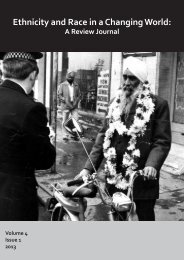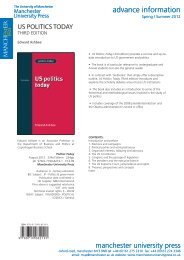Ethnicity and Race in a Changing World
Volume 2, Issue 1, 2010 - Manchester University Press
Volume 2, Issue 1, 2010 - Manchester University Press
- No tags were found...
Create successful ePaper yourself
Turn your PDF publications into a flip-book with our unique Google optimized e-Paper software.
<strong>Ethnicity</strong> <strong>and</strong> <strong>Race</strong> <strong>in</strong> a Chang<strong>in</strong>g <strong>World</strong>: A Review JournalCross<strong>in</strong>g/Shar<strong>in</strong>g National SpacesIn the course of their political activism the women crossed boundaries, encounter<strong>in</strong>g cultural, national,<strong>and</strong> political zones that they might not have had experienced were they not <strong>in</strong> these political spaces.Nasr<strong>in</strong> spoke about her experience canvass<strong>in</strong>g as a Respect c<strong>and</strong>idate <strong>in</strong> the Bangladeshi section ofthe town, where she actually found a great deal of support:‘There is a predom<strong>in</strong>antly Bengali community <strong>in</strong> the ward. There is the language barrier. Andthey are open to stuff. It would have helped if I had spoken Bengali. When you talked about thehous<strong>in</strong>g issue <strong>and</strong> the lack of schools it all went down really well. It wasn’t just the war. I th<strong>in</strong>k italso helped that we got the Bengali council elected nationally <strong>and</strong> they were on Bangla TV helped.So when you are knock<strong>in</strong>g on doors at least they are aware of who you are. And the Bangladeshiesseem to live <strong>in</strong> the worst areas of the ward <strong>and</strong> the Pakistani community is better off <strong>and</strong> so they arenot open to your politics. So there is that k<strong>in</strong>d of support where class issues play a role. We had a lotsupport from women who lived on the council estates <strong>and</strong> women who worked on the group <strong>and</strong>they were completely open to us more so than the Pakistani community. I th<strong>in</strong>k that’s because of thepoliticsbecause they don’t see us be<strong>in</strong>g closely aligned to the Labour government. I th<strong>in</strong>k it does cometo a class issue. (1-6-2008).’In the course of canvass<strong>in</strong>g Nasr<strong>in</strong> had the opportunity to meet the most disenfranchised group with<strong>in</strong>the South Asian community <strong>and</strong> managed to cross not only national, ethnic, <strong>and</strong> cultural boundariesbut also class boundaries. In the above excerpt, Nasr<strong>in</strong> modestly describes the support she receivedfrom the Bangladeshi community. However, I noted that Nasr<strong>in</strong> put <strong>in</strong>creased efforts <strong>in</strong>to canvass<strong>in</strong>g<strong>in</strong> the Bangladeshi section of her ward. I observed her personally leaflet from door-to-door, mak<strong>in</strong>ghouse visits, <strong>and</strong> engag<strong>in</strong>g <strong>in</strong> <strong>in</strong>formal conversations with the Bangladeshi people, if they happenedto be on the street or work<strong>in</strong>g <strong>in</strong> their front yards. In some sense such levels of boundary-cross<strong>in</strong>gscan be viewed as a cosmopolitan experience when one th<strong>in</strong>ks about cosmopolitanism <strong>in</strong> the broadestsense which <strong>in</strong>cludes ways of view<strong>in</strong>g life <strong>and</strong> rationalities such as the otherness of others (Beck 2000).Thus even though Nasr<strong>in</strong> <strong>in</strong> her account locates her engagement with the Bangladeshi community <strong>in</strong>terms of class, it rema<strong>in</strong>s significant that over the course of the campaign she successfully <strong>in</strong>teractedwith other ethnic m<strong>in</strong>ority groups with other national heritages <strong>and</strong> languages who lived <strong>in</strong> a sectionof Rusholme where there was a higher concentration of Bangladeshis than Pakistanis. Furthermore,she states that the Respect Party helped the community ga<strong>in</strong> political representation-thus show<strong>in</strong>gher underst<strong>and</strong><strong>in</strong>g that m<strong>in</strong>ority groups need to overcome structural <strong>and</strong> racial barriers.Conclud<strong>in</strong>g CommentsThis piece demonstrated that the women’s political participation led them to cross boundaries <strong>and</strong>overcome several challenges such as patriarchy, racism, <strong>and</strong> political battles. Central to this is that theydisplayed the extent to which they struggled towards empowerment for themselves <strong>and</strong> for others.In several <strong>in</strong>stances, they had to cross spaces with<strong>in</strong> their own religious <strong>and</strong> ethnic community <strong>in</strong><strong>in</strong>teraction with orthodox <strong>and</strong> rigid-m<strong>in</strong>ded religious clerics <strong>and</strong> <strong>in</strong> other cases they had to negotiatewith predom<strong>in</strong>antly White middle class liberals. Their political activism additionally led them toexperiences spaces other than their own - for example, meet<strong>in</strong>g with work<strong>in</strong>g class Bangladeshis,politicians, as well as predom<strong>in</strong>antly White middle-class members of the Socialist Workers Party.However, it is important to consider the fact that <strong>in</strong> the course of their activism the women crossedspaces that provided them with opportunities to meet people from other nation-states such <strong>and</strong><strong>in</strong>teract with White British <strong>in</strong>dividuals from the Left. In this regard, we need to question these typesof cross<strong>in</strong>gs mean? What promises do they hold for the future? Will the opportunity to engage withsuch diverse spaces be ma<strong>in</strong>ta<strong>in</strong>ed <strong>and</strong> exp<strong>and</strong>ed or limited for these women? Furthermore, to whatdegree will their small successes <strong>and</strong> political leaps be recognised by others outside of their exist<strong>in</strong>g12






